HESSTON, Kansas (Mennonite Church USA) — The Constituency Leaders Council (CLC) met at Hesston Mennonite Church Oct. 17-19 for its third meeting of the biennium to listen, discern and advise the denomination on issues facing the church and its future.
The CLC is a body of elders for Mennonite Church USA consisting of an Executive Board (EB) representative, area conference leaders, constituency group representatives and agency and national office staff. It is the primary forum for conversation among area conferences in Mennonite Church USA. Each conference is invited to send up to three representatives.
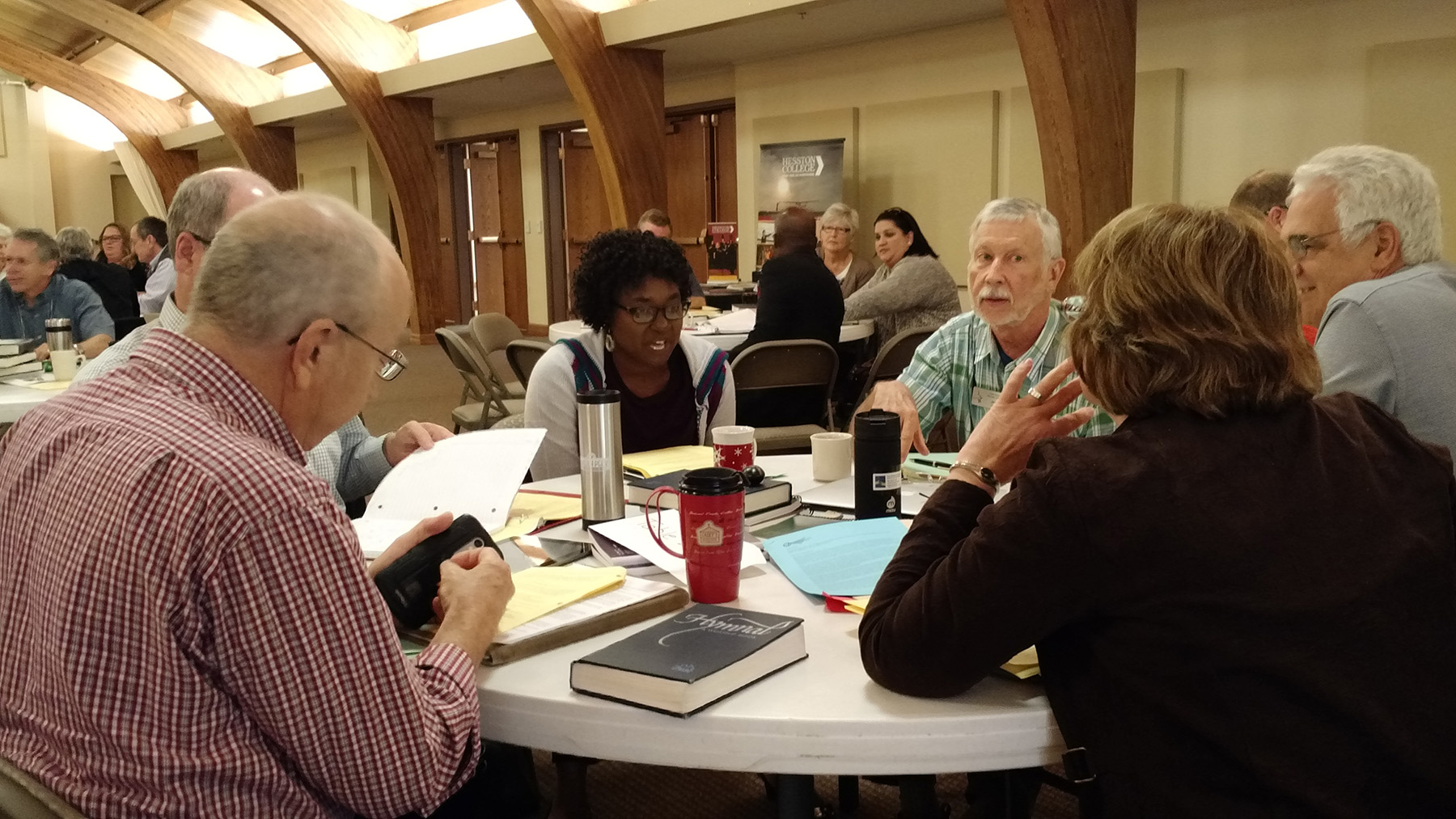
CLC table groups discuss peer-to-peer review. Pictured here at Table #2 (left to right): Bob Sauder (Ohio Conference moderator), Sid Berkey (Central Plains Conference), Grace Pam (Pacific Southwest), Jack Swaim (Pacific Northwest), Gene Miller (New York Conference minister), Nancy Kauffmann (EB staff). Photo by Janie Beck Kreider.
Agenda included evaluation of a pilot peer review process, a presentation from young leaders in the church, consideration of a new model for the 2017 Delegate Assembly in Orlando, discerning Mennonite Church USA’s ongoing relationship with Mennonite Church Canada and time to hear from thriving missional churches.
On the morning of Oct. 19, Joy Sutter, a hospital administrator and current member of the Mennonite Church USA EB, was unanimously affirmed by the CLC as the next moderator-elect of the church beginning in 2017.
Pilot peer review process
In March 2016, the CLC discussed peer-to-peer review as a potential mechanism for responding to issues of difference that arise between area conferences. In response to feedback given at that meeting, the CLC planning committee commissioned a pilot process to conduct a peer review with Central District Conference (CDC) in response to its licensing of Mark Rupp, a gay man in a committed relationship, as pastor of Columbus (Ohio) Mennonite Church in July 2015, and its development of a conference rationale for doing so. After seeking nominations from the CLC, the planning committee appointed four persons to engage in the pilot project—Elizabeth Troyer-Miller, chair, Central Plains Mennonite Conference; Marco Güete, Southeast Mennonite Conference; Mary Etta King, Mountain States Mennonite Conference; and Terry Zehr, New York Mennonite Conference. The committee submitted a report to the CLC to discuss at its October meeting, and presented its findings to the group alongside leadership from CDC.
In their meeting with the peer review team in August, CDC leaders described their conference as “a family of adult siblings” who share a common faith and work together with a common mission, but “do not feel a need to control each other.”
The Ministerial Committee of CDC followed its “normal pattern” in assessing Rupp’s call to ministry. The CDC report states: “The strength of that assessment, and the Spirit’s nudging toward readiness to test a new more inclusive direction, led the committee to recommend (Rupp’s) licensing toward ordination. In recognition that a decision to license (Rupp) would likely place CDC ‘at variance’ with MC USA, the committee invited the CDC Board to join in the discernment, since they hold primary responsibility for our mutual accountability in MC USA.”
Recently appointed CDC conference minister Doug Luginbill described the result of their decision-making process. “This journey led us to be ‘at variance.’ We didn’t choose this in order to be difficult or to thumb our theological noses at anyone,” he explained. “In some ways the decision chose us, having walked through the process carefully.”
“Christian unity is not ours to create, but is a gift from God,” added Lisa Weaver of CDC. The CLC was invited to offer feedback on the peer review process – including instances where a peer review might be needed, suggested modifications to the pilot model and whether this process should continue in the future.
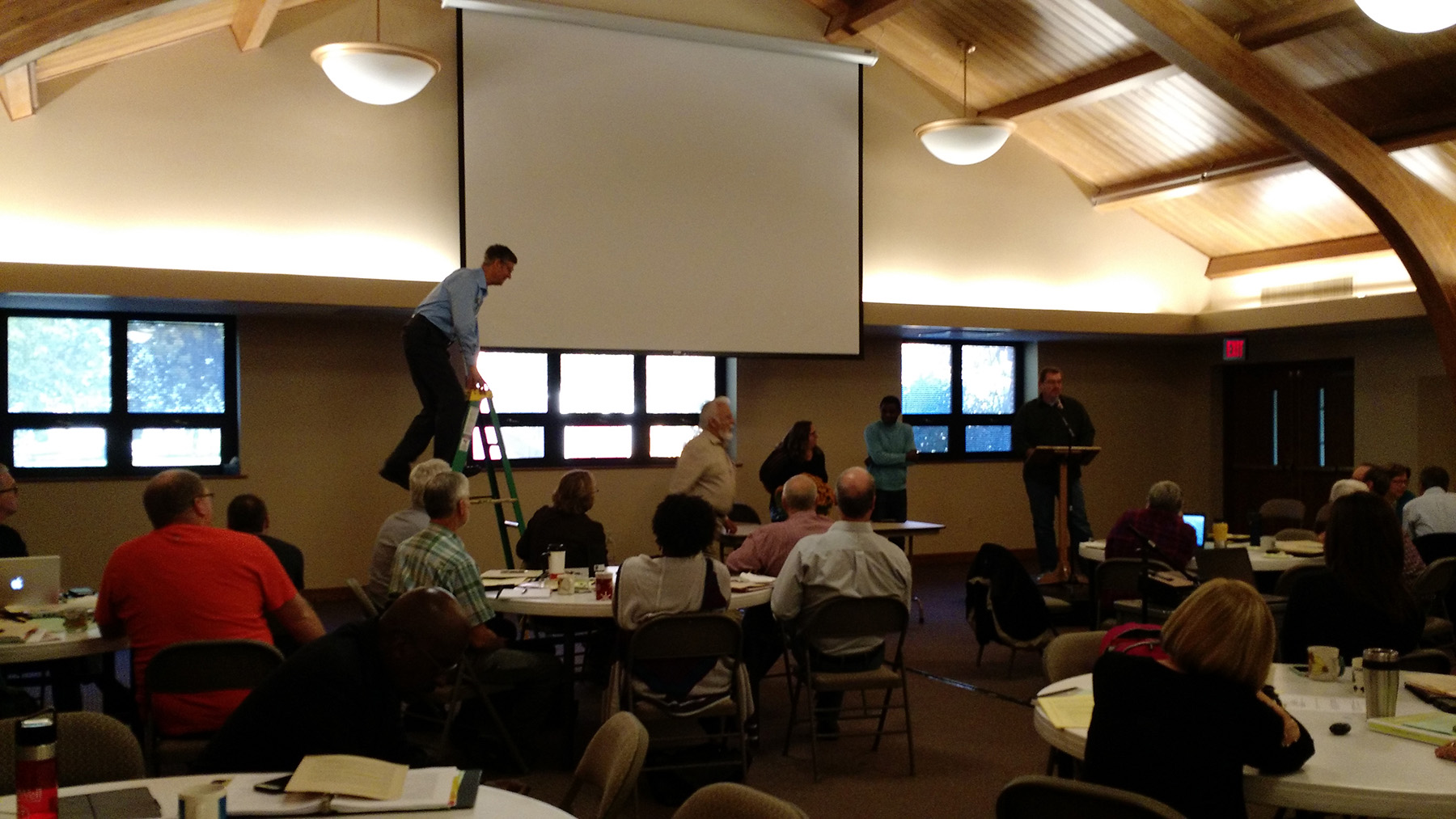
During the listening committee’s report, Rodger Schmell (Eastern District) asked Mennonite Church USA executive director Ervin Stutzman to climb a ladder. “See how silly it is to put someone in a position, and then not be able to support them?” Schmell asked the group as he thanked Stutzman for his leadership of the denomination during challenging times. Photo by Janie Beck Kreider.
Some responded that the review process provided a good way for conferences to deal with differences. Others felt that the current model is punitive and not forbearing, and wondered if it could be used beyond censorship. Others noted that the outcomes were not significant or surprising, and thus the dollars and time spent were not justified. Some expressed concern that the process was harmful to Rupp, who was present during the review. A CDC spokesperson clarified that the CDC had invited Rupp to the review meeting.
CLC members were silent when asked to provide rationale to continue peer review. Ideas for modifications were offered. Nearly all prefer a relational and invitational model, in which conferences could request feedback or input in processing decisions. There were differing opinions about what constitutes a punitive review, and whether or not the current review was indeed punitive. Another suggestion included peer review for every conference on a rotating basis “to see how we’re carrying out our vision.”
A final report from the Peer Review Team and a summary of the CLC table group feedback will be shared with the Executive Board at its November meeting. The Executive Board will take seriously the counsel of the CLC and consider the future of the peer review model as called forth by delegate action at Kansas City in 2015.
Report from MC Canada
Willard Metzger, executive director of Mennonite Church Canada, brought a report. A significant aspect of the “covenant of partnership” shared by the two denominations is the joint ownership of the following documents: Confession of Faith in a Mennonite Perspective (CoF), A Shared Understanding of Church Leadership and dozens of resources for leaders and congregation.
Since 2008, MC Canada has undergone a community discernment process on “Being a Faithful Church” regarding the question of healthy sexuality and biblical discernment.
At its summer 2016 Assembly, MC Canada decided not to change its definition or understanding of marriage, but kept the CoF as written while acknowledging that there are congregations and individuals that have felt led in ways that are different from the stated position. Metzger described this as a time of “testing” for some in the denomination “to see if this is a nudging of the spirit or not.”
“Forbearance isn’t the same as defining a new normative,” Metzger explained. “It’s providing space for congregations to operate outside what is normative, while discerning, ‘Is this of God?’”
The role of leadership in MC Canada’s process, he continued, is not to do the discerning, but to create the context to ensure discernment happens by the whole community in a context of worship, prayer and mutual respect.
Orlando Delegate Assembly
Glen Guyton, chief operating officer and director of convention planning for MC USA, brought a proposal for a new Delegate Assembly process at Orlando 2017. With no set agenda or control by current denominational leadership structures, delegates and key stakeholders would be asked: “What are the most important elements that are holding us together as a denomination?”
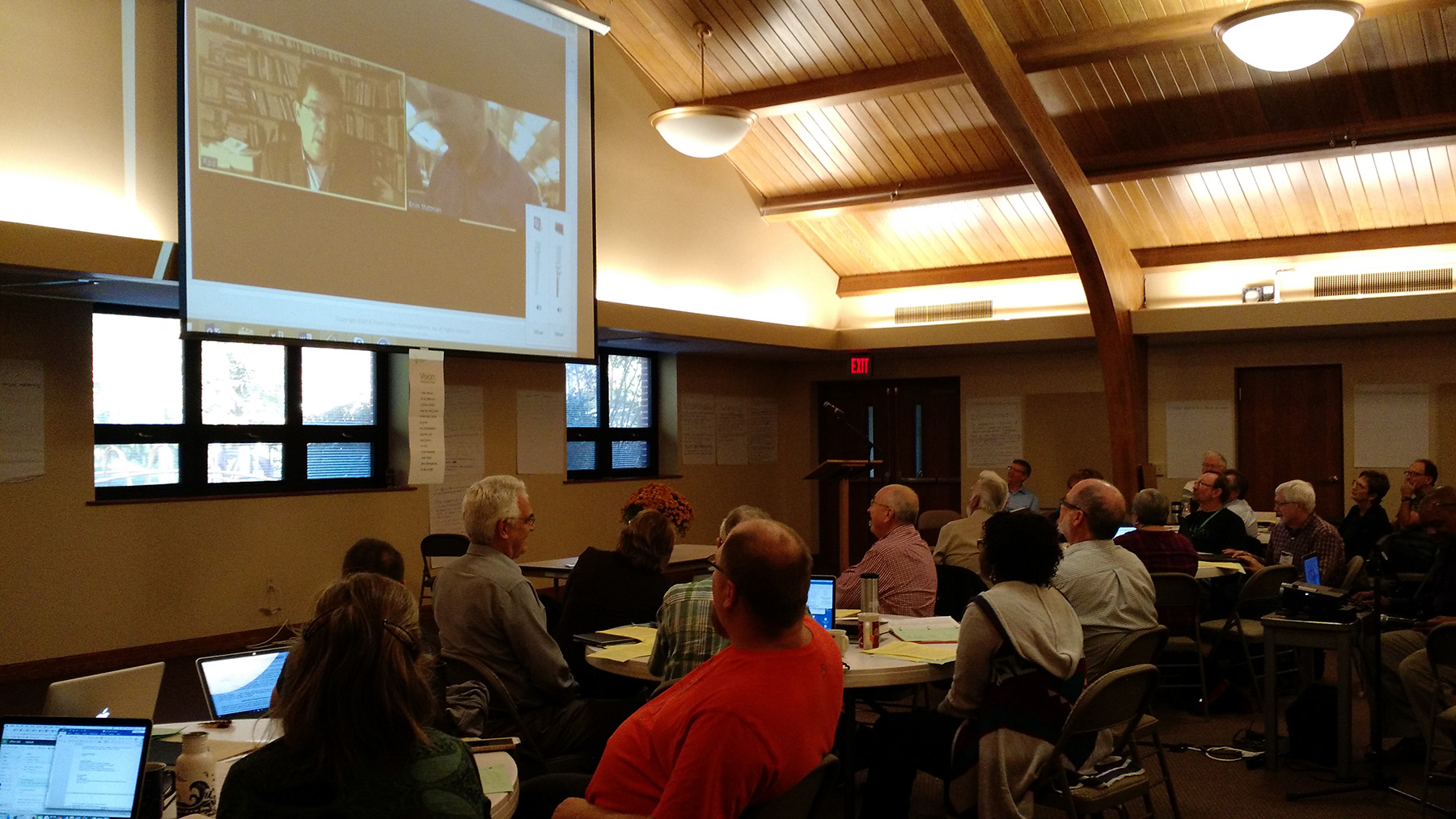
Pictured on screen: Rod Stafford (Portland Mennonite Church) presents a new draft of the resolution on Israel/Palestine via video conference in preparation for the 2017 Delegate Assembly in Orlando. Photo by Janie Beck Kreider.
“This is a generative, transparent process, not a top-down process,” Guyton explained. “This is a chance for the delegates and other key stakeholders in the room to shape the strategy we’ll have moving forward.”
There was clear affirmation from the CLC to move forward with this direction and do something different than the traditional Delegate Assembly model. With the exception of the Israel/Palestine resolution, which was tabled at the Kansas City convention in 2015, it is likely that no other resolutions will be up for a vote by the delegates.
The Executive Board will review the proposal and make a final decision in its next meeting Nov. 10-12.
Young adult presentation
Several younger pastors – Sandra Montes-Martinez, Jessica Schrock-Ringenberg, Peter Eberly, Meghan Good and Jeremy Shue – were asked by CLC chairman David Boshart to prepare a presentation for the CLC. Together they wrote “An Appeal for Healing and Hope for the Future of Mennonite Church USA from Younger Church Leaders.”
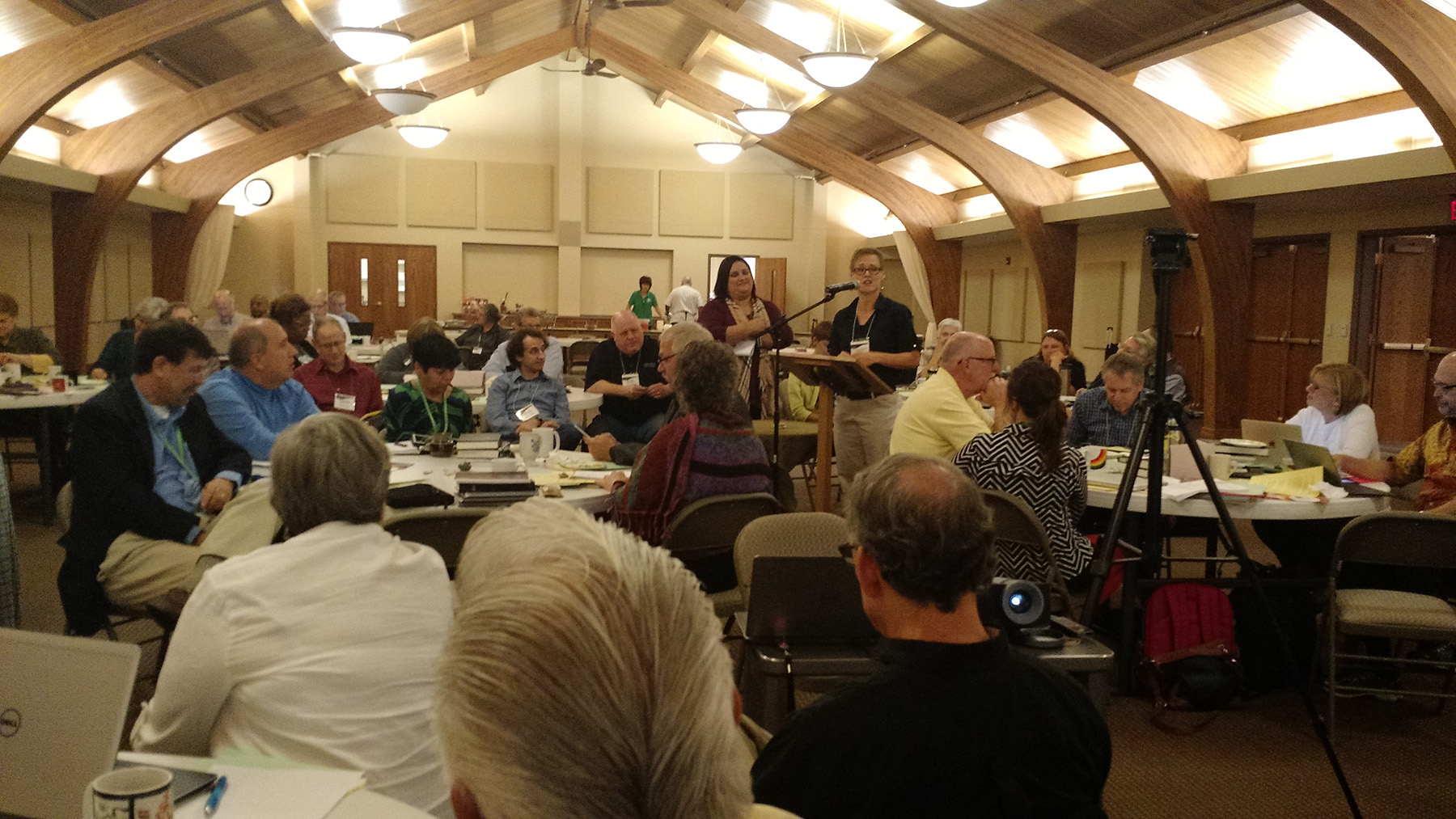
Sandra Monte-Martinez (moderator of Iglesia Menonita Hispana) and Jessica Schrock-Ringenberg (Ohio) address the CLC from the center of the room. Photo by Janie Beck Kreider.
Montes-Martinez, moderator of Iglesia Menonita Hispana, and Schrock-Ringenberg, pastor of Zion Mennonite Church, Archbold, Ohio, chose to speak from the center of the room rather than from the stage, noting that there are too many things competing for center stage.
“The future of the church doesn’t look anything like the church today,” said Schrock-Ringenberg. She continued: “When it was written, the Confession of Faith was where we stood, but it said nothing about where we were going. Our vision statement was a beautifully drafted statement that became a footnote in the life of our church. We as a denomination started from the wrong place. We started from a polity that divides us and continues to create tension, and we are calling for a do-over. This do-over would call us to live into the ‘Vision for Healing and Hope,’ and we believe that will move us forward into the future.”
The women passed out pieces of broken pottery, representing each CLC member’s hopes, dreams and imperatives for what the church must “get right.”
“Notice the broken edges of pottery, where it was once attached to something bigger than itself. Your piece, although important, is just one part of the un-seeable whole,” Schrock-Ringenberg said. “None of us knows what this thing is going to look like.”
CLC members were invited to bring their broken shards of pottery forward as a symbolic gesture focusing on the shared denominational vision rather than their individual pieces. “We don’t say that your piece is not important; we say your piece is part of the whole,” Montes-Martinez said. “We’re not telling you to discard your piece, but to bring it to the center to make the whole.”
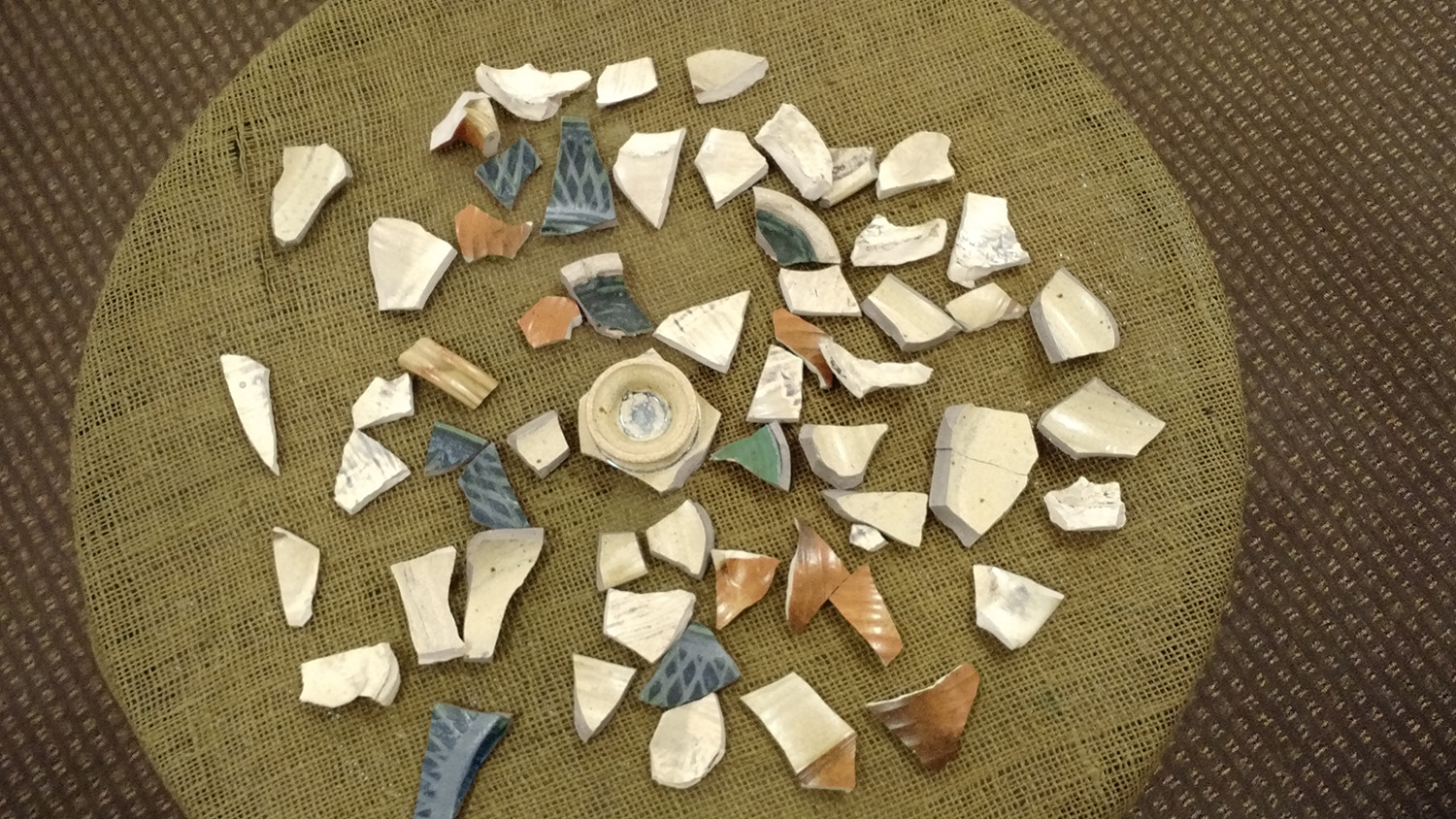
CLC members bring together individual shards of broken pottery as a symbolic gesture focusing on a shared denominational vision. Photo by Janie Beck Kreider.
Together, the women led the group in reading in unison the Mennonite Church USA vision statement, inviting CLC members to “live what we’ve agreed upon” and “to be Jesus followers, putting aside our tribalism.” The statement also calls for attention to “spiritual negligence.”
Living into a missional future
Church leaders from two thriving missional churches shared stories with CLC. Howard Wagler, lead pastor at Journey Mennonite Church, a congregation with three campuses in Kansas, led a discussion on the “sending nature of God” and opportunities to serve as missionaries “in the places where we live, work and play.”
Kristin Jackson, Equipping Pastor of Living Water Community Church, a multi-ethnic congregation in Rogers Park, Illinois, spoke via video conference. Living Water is situated in one of the most diverse neighborhoods in the Chicago area, and has found creative ways to welcome diversity with worship that includes eight different languages. “There’s a hunger for the gospel among many people in this area, particularly among refugees, who are experiencing a crisis; they therefore are looking for help, for community,” she said. Over the course of its 20-year existence, the congregation has transformed from a “monoculture” into a community of many cultures, working to meet the particular needs of each group.
Struggling with diversity
The CLC changed its organizational structure document to mandate at least one person of color serve on the planning committee, which sets the agenda for CLC. Nominations were taken by ballot to add an “at-large” member to the currently all-white team. Shannon Dycus (Indiana-Michigan Conference) accepted the nomination and will serve out the rest of the term with the planning committee.
Toward the end of the meeting, the listening committee reported the need to give “immediate attention” to intercultural awareness and sensitivity within the CLC, and issued a call to work at this in between meetings.
The listening committee also noted the persistence of a pre-merger denominational Mennonite Church/General Conference divide contributing to a “lack of clarity around the issue of authority” in the church. Some desire a more top-down approach, while others feel it is already too top-down. The committee heard concerns that the church is in a “state of chaos” affected by internal conflict and the current political culture of reactivity. “We hear of anticipation of further division,” they reported.
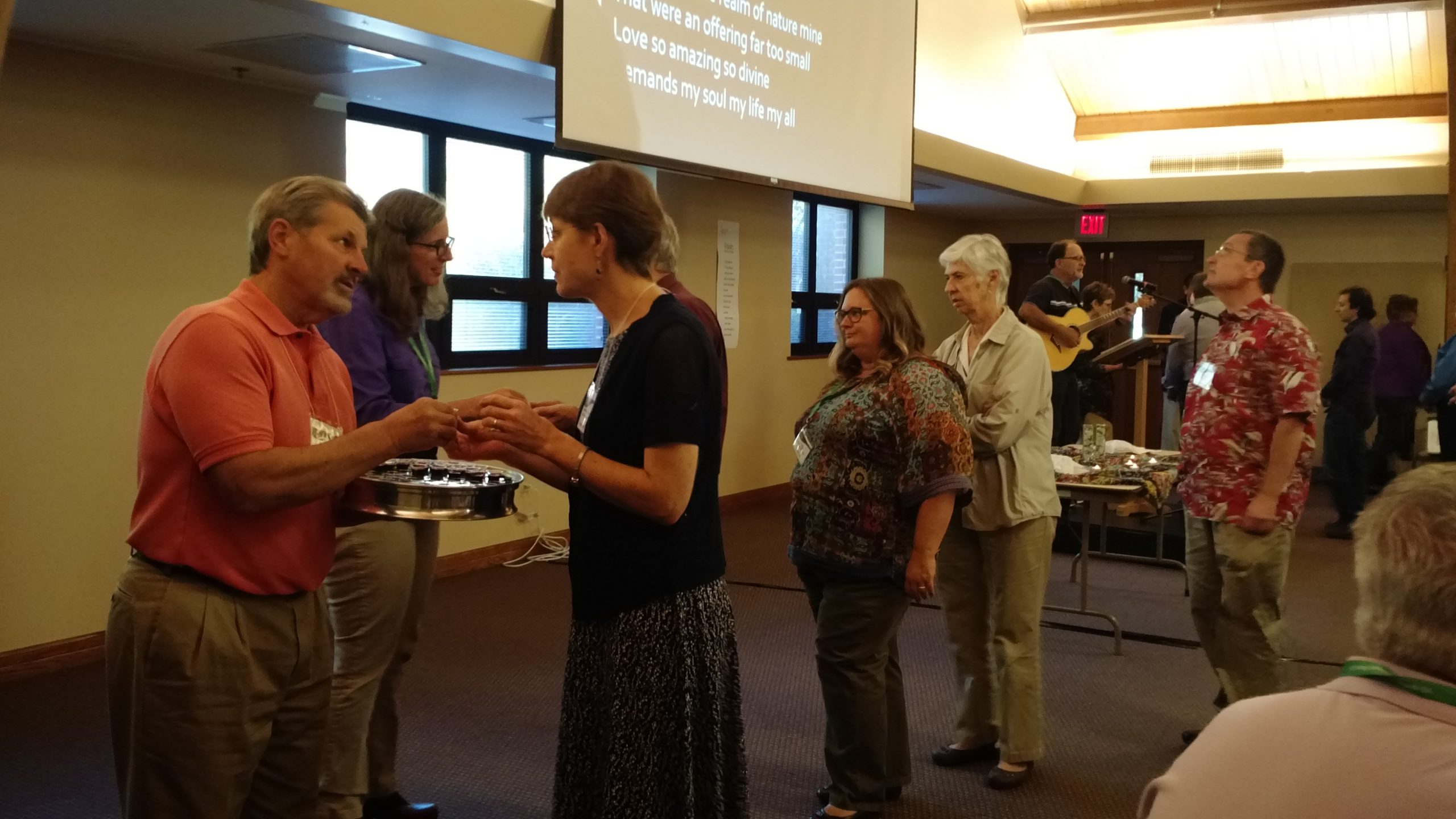
Members of the CLC celebrate communion during opening worship. Photo by Janie Beck Kreider.
Worshipful Work
Mike Zehr led music throughout the meetings, and Jane Hoober Peifer served as worship leader. Opening worship included communion. “We begin at this place remembering the loving faithfulness of Jesus,” Peifer said. “This is the table not of the church, but of the Lord.”
Grace Pam (Pacific Southwest Mennonite Conference) closed the open mic time with intercessory prayer. “The whole church is depending on us to intercede,” she said. “We pray for leadership, for the EB, for the work in different conferences, for the conference leaders. Lord we ask for a deeper call, for a call into the deep. Help us to forgive one another where our feet have been trampled upon. Unite and bind us with cords that cannot be broken. As we leave, plant in us things to continue to meditate on. For the challenge is overwhelming, but your grace is sufficient.”
The next meeting of the CLC will be held March 16-18 in Elkhart, Indiana.
# # #
—Mennonite Church USA staff

